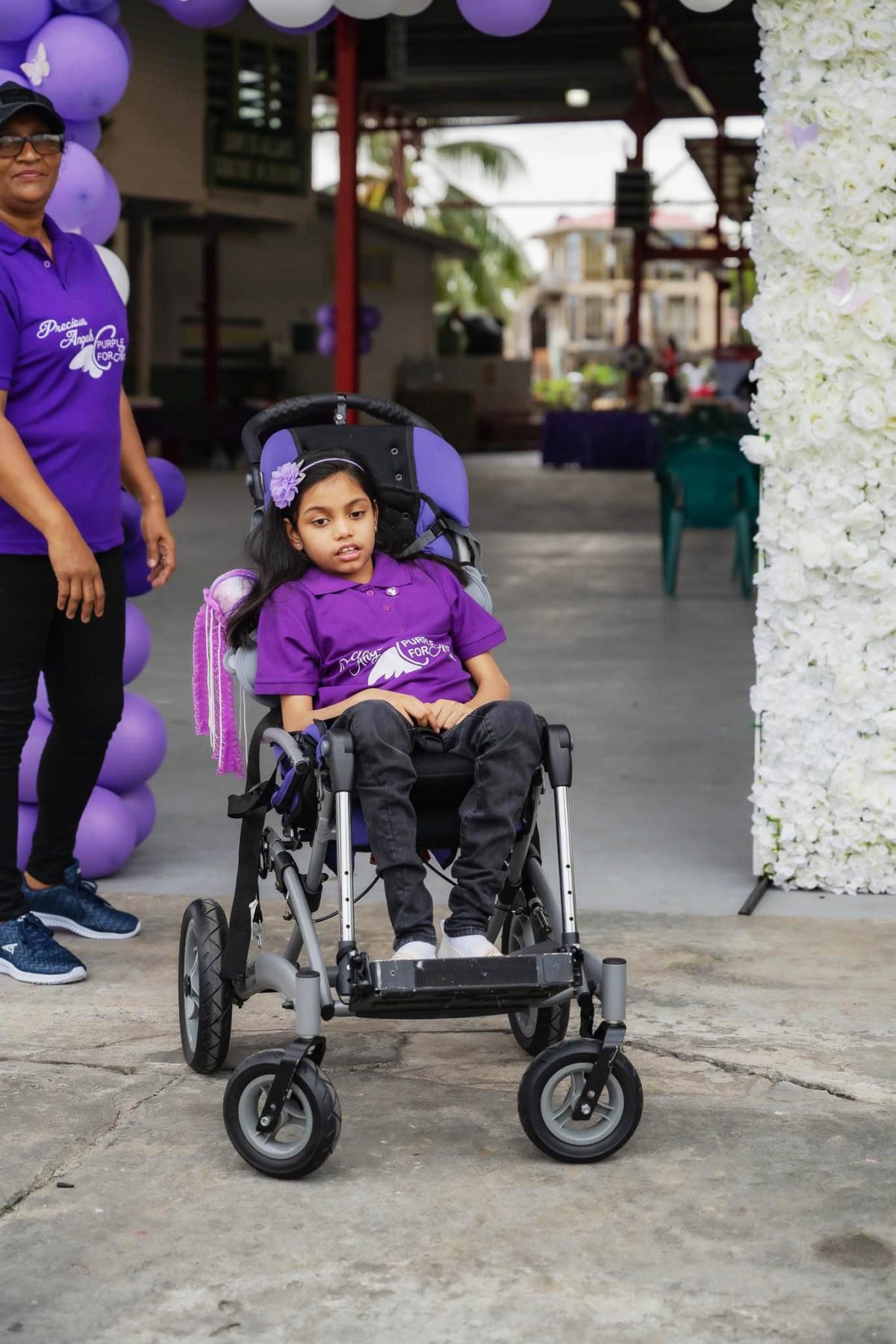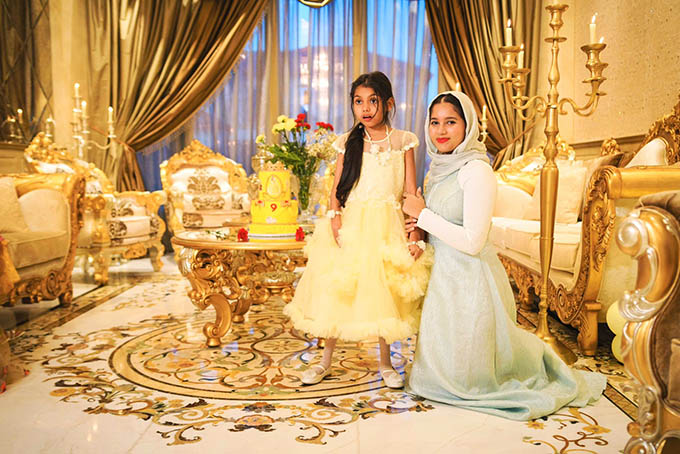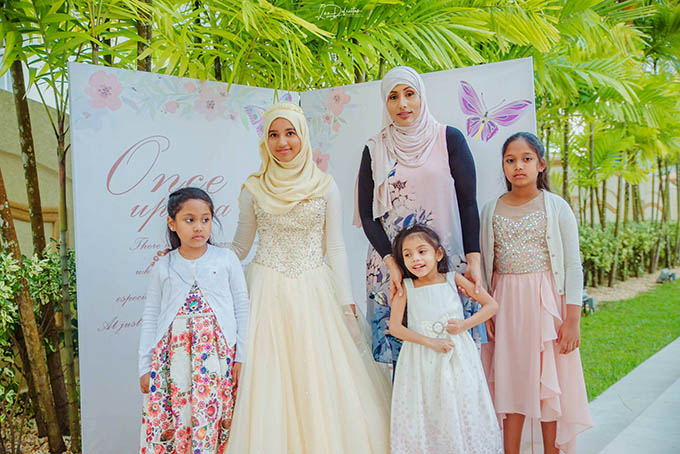Nine years ago when Amani Mohamed entered this world she was a bouncing baby girl who was developing as per norm. However, months later those around her realised that something was wrong and following several doctors’ visits she was diagnosed with the rare condition Rett syndrome, which not only affected her speech but her general motor skills.
So rare is this condition that Amani is the only known child with it in Guyana. However, paediatrician Dr Mallika Mootoo, who has been supporting Amani and her family over the years, said there may be more children with the condition but because the symptoms are close to other conditions they may not have been diagnosed.
“I would not say that we have a lot of children with Rett syndrome because it is a very rare disease. But I wouldn’t be surprised if we have another one or two children who have just not been diagnosed… because it is so rare and because it overlaps with so many things,” Dr Mootoo explained.
Amani’s condition and her will to fight influenced her aunt, Hadiyyah Mohamed, to start the Precious Angels Charity, which works on putting the spotlight on the condition. In 2019 and again this year, walks to observe Rett syndrome (done throughout the world in the month of October) saw a huge turnout.
According to the Mayo Clinic, Rett syndrome is a rare genetic neurological and developmental disorder that affects the way the brain develops. This disorder causes a progressive loss of motor skills and language. The condition primarily affects females, because males have a different chromosome combination. According to the clinic, most babies with Rett syndrome seem to develop as expected for the first six months of life. They then lose skills they previously had — such as the ability to crawl, walk, communicate or use their hands. Over time, children with Rett syndrome have increasing problems with the use of muscles that control movement, coordination and communication. The condition can also cause seizures and intellectual disabilities. Unusual hand movements, such as repetitive rubbing or clapping, replace purposeful hand use. Although there’s no cure for Rett syndrome, potential treatments are being studied. Current treatments focus on improving movement and communication, treating seizures, and providing care and support for children and adults with Rett syndrome and their families.
The clinic said males who have the genetic changes that cause Rett syndrome are affected in devastating ways. Most of them die before birth or in early infancy. A very small number of males have a different genetic change that results in a less destructive form of Rett syndrome. Similar to females with Rett syndrome, these males are likely to live to adulthood, but they’re still at risk of a number of intellectual and developmental problems.
Inspired
“I was inspired by my niece, my brother’s youngest daughter who was diagnosed with Rett syndrome,” Hadiyyah Mohamed said. “She was born on January 20th, 2013, normal baby, she was healthy, she developed normally. …but then around, I would say between nine months to a year we started seeing slight signs of loss of motor skills, loss in speech…”
She added that skills her young niece already had slowly faded and the family became worried and confused which resulted in them visiting doctors who themselves were confused but one diagnosed her with autism.
They later took her to see Dr Mootoo who indicated that it was more than autism but that Guyana did not have the health facility or personnel at that time to make the diagnosis and the family was referred to Trinidad.
Dr Mootoo told this newspaper that when Amani was taken to her she was already walking and saying a few words but then started to regress. She pointed out that there are some similarities between autism and Rett syndrome but Amani’s mother did not believe the diagnosis of autism fit her daughter.
Following screening, Dr Mootoo said she also did not believe it was autism and she concluded that Amani had a neurological problem.
“It was not an easy discussion to have… there was definitely something wrong. It didn’t fit into any of the boxes that we normally see. I did tell her that I thought it was some sort of neurological problem that may or may not have a cure and that she should see a paediatric neurologist,” she recalled.
She explained that a typical sign of Rett syndrome is a hand movement “almost like the ringing of the hand, or like if you are ringing clothes…” and she had noticed this with Amani even though at that time it was not very pronounced.
In Trinidad, a neurologist diagnosed Amani with Rett syndrome before she attained the age of two.
Mohamed said it was the first time the family had heard of the condition and she admitted that “it was a tough pill to swallow at first. It wasn’t easy.
We were sad. We were hurt but in the end we decided this is how it is, this is how it is going to happen. There is no known cure. It is a very rare disorder and what we can do now is to be there for her, provide her with love and the care that she needs,” she told Stabroek Weekend in a Zoom interview from the United Kingdom, where she is studying journalism.
The diagnosis meant that her niece needed speech therapy, physical therapy, occupational therapy among others. She would also experience seizures as a result of the condition which progresses with age.
“She has so many seizures… it is very scary and we are just hoping to raise awareness about it… We are trying to inform people about this and in the long run provide the care that they need,” she said of the charity.
Describing a normal day for Amani, whom she said was hilarious at times, Mohamed said she would wake at 8 am on the dot or sometimes even earlier.
“She is very punctual with her time, she has to eat on time, she has to sleep on time everything…” she further shared.
Amani attended the M E T Pride Academy – Special Needs School prior to COVID-19. It is hoped that it will be reopened soon. Mohamed recalled that she was very happy to be with her friends in school and that they had changed quite a few schools before she was settled at M E T Pride.
“She loves to be with her family. She loves her two older sisters. She loves to look at funny movies, Princess movies… and she is just a very sweet, precious angel. She is amazing. You know, I have never seen her have a breakdown or throw a tantrum or cry or pout? She is always smiling and I really admire her for that…” the aunt said.
She pointed out that it is not easy for the family, even more so for her niece who goes through so much pain yet manages to keep a smile on her face.
Dr Mootoo, who continues to work with Amani, explained that they try to prevent or deal with complications as they arise and confirmed that she needs a lot of therapy and has a rehabilitation specialist who works with her.
She lost her speech and then the ability to walk, but with the help of the specialist she has regained the ability to walk.
“Amani has always been a very expressive child from the beginning. One of the things we tend to forget when we see children that have no speech is that they find other ways to communicate with us. And she is a very expressive, lively girl and she can block you out if she is not interested in what you are saying,” Dr Mootoo said.
She also engages with her eye movement and facial expressions and Dr Mootoo gave the example of her making it clear that she did not like one of the medical students that work in her office. “With her eyes, with her body language she clams up and then if I ask the student to just step outside to see what is happening with her she is a different child once the student is gone,” she explained.
Her face also lights up when she hears her sisters’ voices.
Feeding can be a challenge but her mother has been working with a nutritionist who has managed to keep her on a good diet and she is eating well.
Precious Angels
Speaking about the charity, Mohamed said she and the others who are on board created an organisation to raise awareness and to eventually build a clinic where people suspected of having the condition can visit for screening, and if they are diagnosed care would also be provided.
Funding would be needed to have this done and the charity over the years has been holding fund-raising activities. People can make donations as well. It has been four years since the charity started but because of COVID the progress slowed. Mohamed said it has been back up and running and its fourth awareness walk (which took place last Sunday) saw over 700 people involved and over $1.6 million raised.
“So it is going really good and we have so much more planned…” Mohamed said adding that a spot for the care centre has been identified on East Street and construction has started.
From next year the charity plans to have more interactive events, such as a marathon and fun days, to get people involved to join the charity and support its work.
Dr Mootoo, who works along with the charity as well, pointed out that research needs money and the more people are aware the more support would be received. She disclosed that a medical trial in the US was recently completed with the hope that it would help diagnosed children with some of the symptoms.
Twenty-year-old Mohamed, who started the charity at the age of 17, is in the UK pursuing a degree in journalism and when asked why that line of study, she responded with a light laugh, “Guyana needs it. I always wanted to do something with capturing different people, their lives, their cultures, their backgrounds. I always liked pursuing something like that, you know, travelling the world,” she further expounded. But the third-year journalism student at Edinburgh Napier University said Guyana is and will always be number one for her.
She hopes to one day soon have her niece visit the UK to be seen by a doctor at a Rett syndrome clinic.
While the family questioned “why us” initially, Mohamed said, they know there is always a purpose for everything and for them it is now about shining light on the condition and aspiring to give people with syndrome assistance they cannot normally access.








